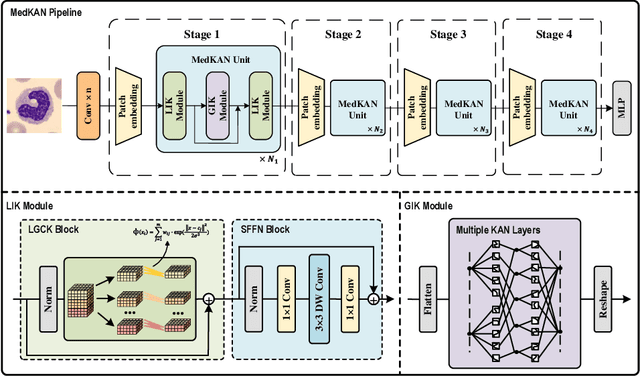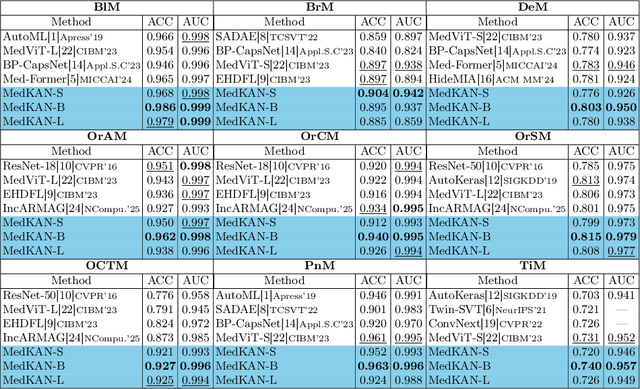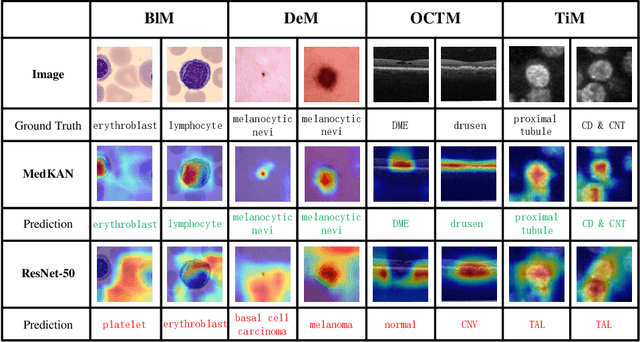Zhuoqin Yang
Vision KAN: Towards an Attention-Free Backbone for Vision with Kolmogorov-Arnold Networks
Jan 29, 2026Abstract:Attention mechanisms have become a key module in modern vision backbones due to their ability to model long-range dependencies. However, their quadratic complexity in sequence length and the difficulty of interpreting attention weights limit both scalability and clarity. Recent attention-free architectures demonstrate that strong performance can be achieved without pairwise attention, motivating the search for alternatives. In this work, we introduce Vision KAN (ViK), an attention-free backbone inspired by the Kolmogorov-Arnold Networks. At its core lies MultiPatch-RBFKAN, a unified token mixer that combines (a) patch-wise nonlinear transform with Radial Basis Function-based KANs, (b) axis-wise separable mixing for efficient local propagation, and (c) low-rank global mapping for long-range interaction. Employing as a drop-in replacement for attention modules, this formulation tackles the prohibitive cost of full KANs on high-resolution features by adopting a patch-wise grouping strategy with lightweight operators to restore cross-patch dependencies. Experiments on ImageNet-1K show that ViK achieves competitive accuracy with linear complexity, demonstrating the potential of KAN-based token mixing as an efficient and theoretically grounded alternative to attention.
Enhancing Federated Learning with Kolmogorov-Arnold Networks: A Comparative Study Across Diverse Aggregation Strategies
May 12, 2025Abstract:Multilayer Perceptron (MLP), as a simple yet powerful model, continues to be widely used in classification and regression tasks. However, traditional MLPs often struggle to efficiently capture nonlinear relationships in load data when dealing with complex datasets. Kolmogorov-Arnold Networks (KAN), inspired by the Kolmogorov-Arnold representation theorem, have shown promising capabilities in modeling complex nonlinear relationships. In this study, we explore the performance of KANs within federated learning (FL) frameworks and compare them to traditional Multilayer Perceptrons. Our experiments, conducted across four diverse datasets demonstrate that KANs consistently outperform MLPs in terms of accuracy, stability, and convergence efficiency. KANs exhibit remarkable robustness under varying client numbers and non-IID data distributions, maintaining superior performance even as client heterogeneity increases. Notably, KANs require fewer communication rounds to converge compared to MLPs, highlighting their efficiency in FL scenarios. Additionally, we evaluate multiple parameter aggregation strategies, with trimmed mean and FedProx emerging as the most effective for optimizing KAN performance. These findings establish KANs as a robust and scalable alternative to MLPs for federated learning tasks, paving the way for their application in decentralized and privacy-preserving environments.
MedKAN: An Advanced Kolmogorov-Arnold Network for Medical Image Classification
Feb 25, 2025



Abstract:Recent advancements in deep learning for image classification predominantly rely on convolutional neural networks (CNNs) or Transformer-based architectures. However, these models face notable challenges in medical imaging, particularly in capturing intricate texture details and contextual features. Kolmogorov-Arnold Networks (KANs) represent a novel class of architectures that enhance nonlinear transformation modeling, offering improved representation of complex features. In this work, we present MedKAN, a medical image classification framework built upon KAN and its convolutional extensions. MedKAN features two core modules: the Local Information KAN (LIK) module for fine-grained feature extraction and the Global Information KAN (GIK) module for global context integration. By combining these modules, MedKAN achieves robust feature modeling and fusion. To address diverse computational needs, we introduce three scalable variants--MedKAN-S, MedKAN-B, and MedKAN-L. Experimental results on nine public medical imaging datasets demonstrate that MedKAN achieves superior performance compared to CNN- and Transformer-based models, highlighting its effectiveness and generalizability in medical image analysis.
Activation Space Selectable Kolmogorov-Arnold Networks
Aug 15, 2024



Abstract:The multilayer perceptron (MLP), a fundamental paradigm in current artificial intelligence, is widely applied in fields such as computer vision and natural language processing. However, the recently proposed Kolmogorov-Arnold Network (KAN), based on nonlinear additive connections, has been proven to achieve performance comparable to MLPs with significantly fewer parameters. Despite this potential, the use of a single activation function space results in reduced performance of KAN and related works across different tasks. To address this issue, we propose an activation space Selectable KAN (S-KAN). S-KAN employs an adaptive strategy to choose the possible activation mode for data at each feedforward KAN node. Our approach outperforms baseline methods in seven representative function fitting tasks and significantly surpasses MLP methods with the same level of parameters. Furthermore, we extend the structure of S-KAN and propose an activation space selectable Convolutional KAN (S-ConvKAN), which achieves leading results on four general image classification datasets. Our method mitigates the performance variability of the original KAN across different tasks and demonstrates through extensive experiments that feedforward KANs with selectable activations can achieve or even exceed the performance of MLP-based methods. This work contributes to the understanding of the data-centric design of new AI paradigms and provides a foundational reference for innovations in KAN-based network architectures.
 Add to Chrome
Add to Chrome Add to Firefox
Add to Firefox Add to Edge
Add to Edge